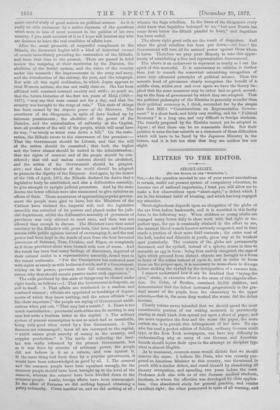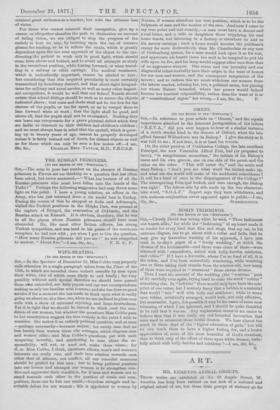LETTERS TO THE EDITOR.
SHORT-SIGHT.
[To THE EDITOR OF THE SPECTATOR:1 Sin,—As the question mooted in one of your recent annotations; is certain, under our present system of compulsory education, to become one of national importance, I trust you will allow me to make a few observations upon "short-sight," a defect which I am in the constant habit of treating, and which has long engaged my attention.
Short-sightedness depends upon an elongation of the globe of the eye from before backwards, and it is moulded in this faulty- form in the following way. When children or young adults are- engaged many hours daily in close work with bad light or im- perfect type, the eye is constantly strained in the effort to see,. the internal blood-vessels become seriously congested, and in time- exude a portion of their more fluid contents ; the outer coat of the ball, tender and dilatable in youth, gives way at its weakest spot posteriorly. The contents of the globe are permanently increased, and the eyeball, instead of a sphere, comes in time to resemble an egg in form ; being thus unduly elongated, the rays of light which proceed from distant objects are brought to a focuii- in front of the retina instead of upon it, and in order to focus them on the proper spot, it is necessary to cause-them to diverge• before striking the eyeball by the interposition of a concave lens..
I cannot understand how it can be doubted that " trying the eyes," strain, or excessive effort is the cause of this singular affec- tion. Dr. Cohn, of Breslau, examined 10,000 children, and demonstrated that the defect increased progressively in the gra- dual ascent of the pupils from the elementary to the upper schools,—that is, the more they worked the worse did the defect become.
Clearly nature never intended that we should spend the most considerable portion of our waking moments in persistently staring at small black dots spread out upon a sheet of paper; and the more imperfect the dots and the worse the paper, the more- certain she is to punish this infringement of her laws. No one who has read a pocket edition of Schiller, ordinary German small type, or the New York newspapers, can have any difficulty in understanding why so many of our German and American friends should injure their eyes in the attempt to decipher typo what is almost illegible.
As to treatment, common-sense would dictate that we should remove the cause. I believe Mr. Dana, who was recently pro posed as American Minister to this country, was threatened in youth with a similar defect, and cured himself by abandoning all literary occupation, and spending two years before the mast. Professor Ark also tells us of two German medical students,. brothers, in whom the affection was developed by close applica- tion. One abandoned study for general practice, and retains excellent sight ; the other persevered in spite of all warning, and
attained great eminence as a teacher, but with the ultimate loss of vision.
For those who cannot intermit their occupation, give up a career, or altogether abandon the path to distinction on account 'of failing vision, we are obliged to stop the progress of the malady as best we may, by insisting upon the use of concave glasses for reading, so as to relieve the strain, which is greatly 'dependent upon the too near approach of the object to the eyes directing the patient to work only in good light, which should -come from above and behind, and to avoid all attempts at study in the recumbent position, while leaning forward, or when travel- ling in a railway or oth-er carriage. The medical treatment, 'which is undoubtedly important, cannot be alluded to here ; but considering that this acquired peculiarity is most certainly transmitted by hereditary descent, and that short-sight incapaci- tates for military and naval service, as well as many other import- ant occupations, it would be well that our School Boards should -ordain that school-fittings should be such as to secure the objects indicated above ; that seats and desks shall not be too low for the stature of the pupils, or too far apart, so as to compel them to lean forward when at work ; that the light shall be good, and above all, that the pupils shall not be overtasked. Nothing they 'can learn can compensate for a grave physical defect which they are liable to transmit to their children and children's children ; and we must always bear in mind that the eyeball, which is grow- ing up to twenty years of age, cannot be properly developed unless it is fairly trained out of doors, for distant objects as well as for those which can only be seen a few inches off.-1 am,
&c., CHARLES BELL TAYLOR, M.D., F.R.C.S.E.







































 Previous page
Previous page